Audit Quality in Australia: Challenges, Ethics, and Technology Impact
VerifiedAdded on 2023/01/05
|13
|3391
|89
Report
AI Summary
This report delves into the critical issues surrounding audit quality in Australia, examining the impact of advanced technologies like AI, cloud computing, and data analytics, which are seen as potential enhancers of audit quality. It addresses the concerns of conflict of interest within audit firms, particularly the Big Four, and how these conflicts can undermine auditor objectivity, potentially leading to corporate failures. The report analyzes the role of the Big Four consulting firms and the efforts of regulatory bodies like ASIC to improve audit quality through increased scrutiny and transparency, including the publication of audit inspection results and the implementation of balanced scorecards. Furthermore, the report explores how the restructured Code of Ethics, as introduced by the International Ethics Standards Board for Accountants (IESBA), can contribute to providing quality audits that serve the public interest, supported by relevant examples and cases, both recent and past, to provide a comprehensive understanding of the complexities of audit quality in the Australian context.
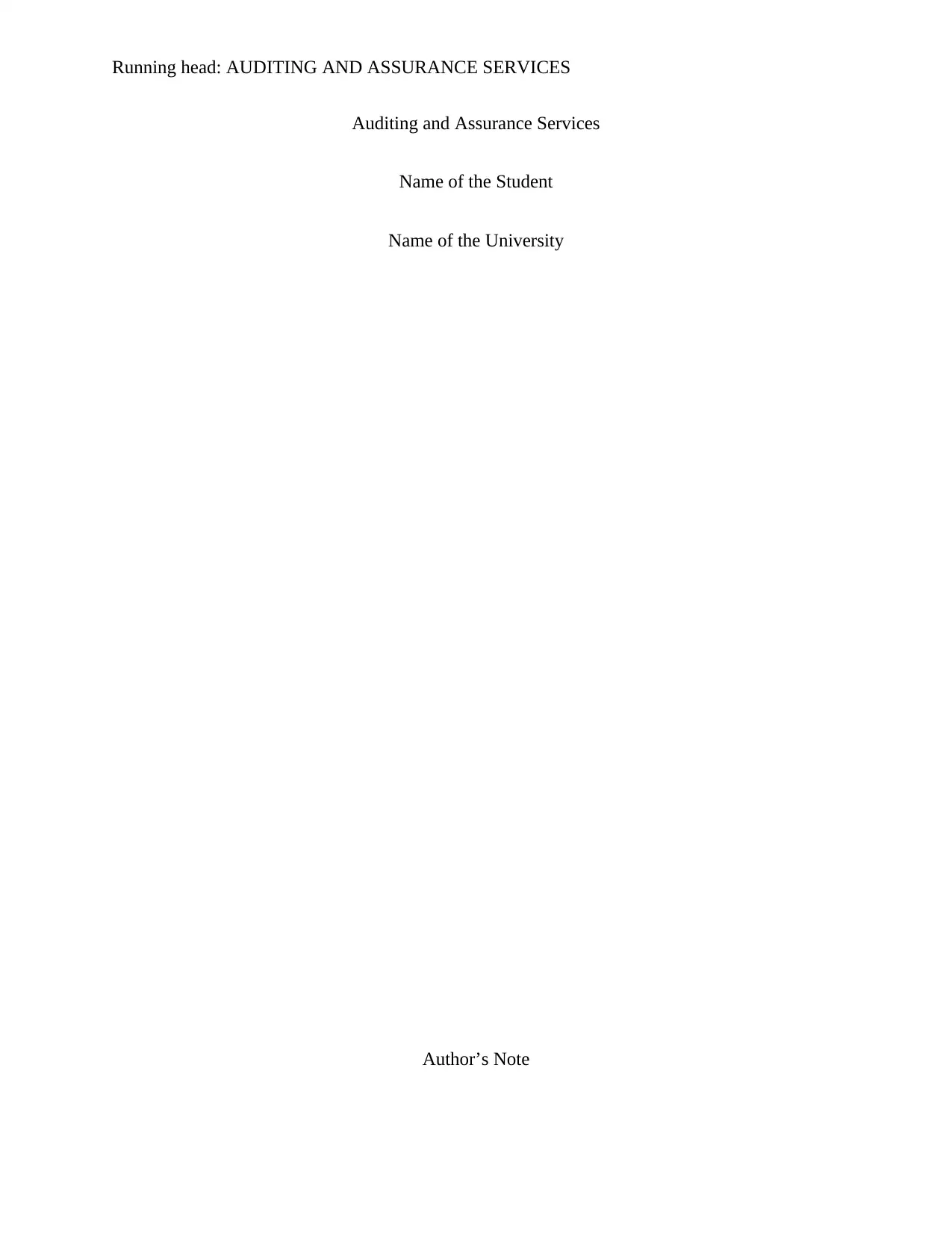
Running head: AUDITING AND ASSURANCE SERVICES
Auditing and Assurance Services
Name of the Student
Name of the University
Author’s Note
Auditing and Assurance Services
Name of the Student
Name of the University
Author’s Note
Paraphrase This Document
Need a fresh take? Get an instant paraphrase of this document with our AI Paraphraser
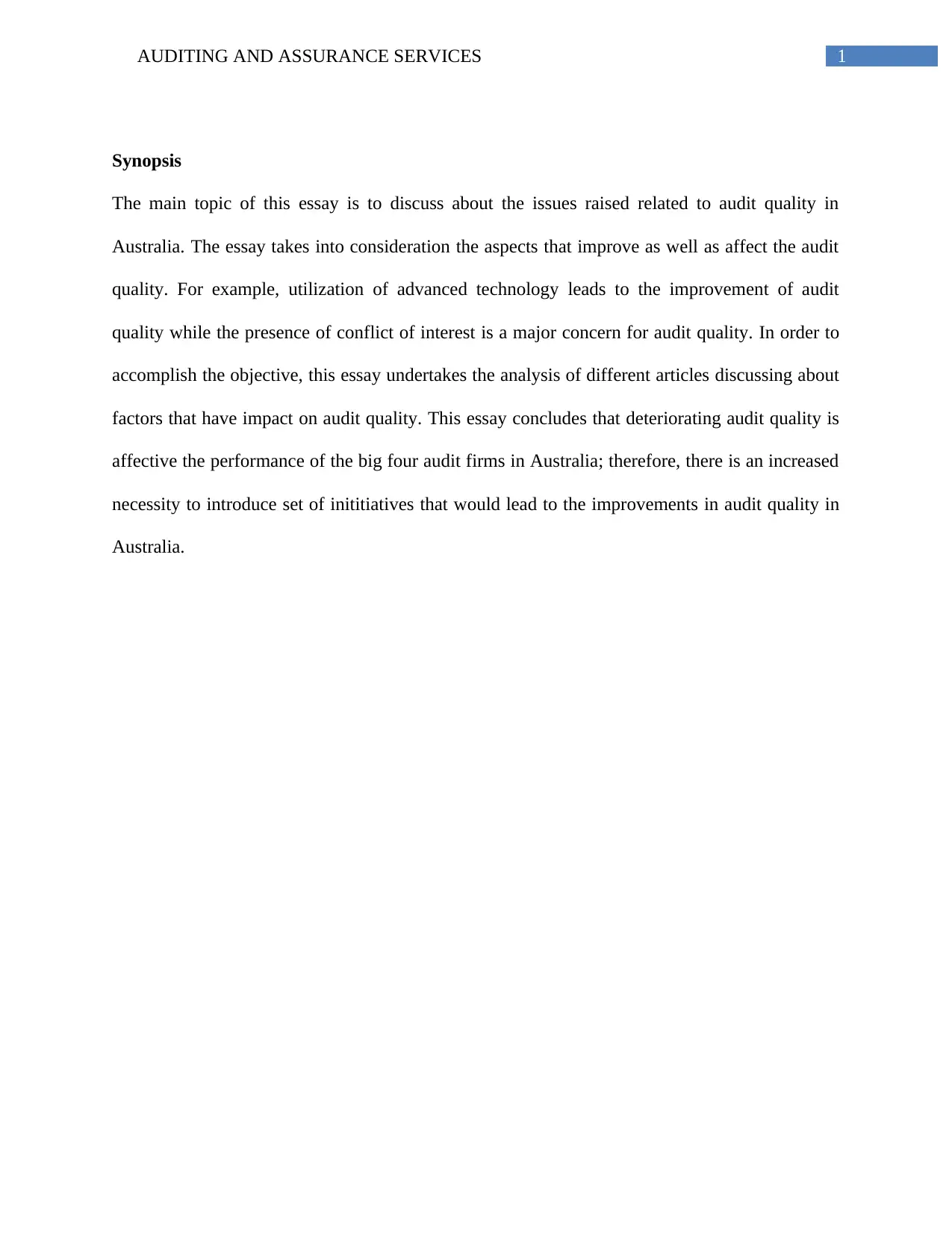
1AUDITING AND ASSURANCE SERVICES
Synopsis
The main topic of this essay is to discuss about the issues raised related to audit quality in
Australia. The essay takes into consideration the aspects that improve as well as affect the audit
quality. For example, utilization of advanced technology leads to the improvement of audit
quality while the presence of conflict of interest is a major concern for audit quality. In order to
accomplish the objective, this essay undertakes the analysis of different articles discussing about
factors that have impact on audit quality. This essay concludes that deteriorating audit quality is
affective the performance of the big four audit firms in Australia; therefore, there is an increased
necessity to introduce set of inititiatives that would lead to the improvements in audit quality in
Australia.
Synopsis
The main topic of this essay is to discuss about the issues raised related to audit quality in
Australia. The essay takes into consideration the aspects that improve as well as affect the audit
quality. For example, utilization of advanced technology leads to the improvement of audit
quality while the presence of conflict of interest is a major concern for audit quality. In order to
accomplish the objective, this essay undertakes the analysis of different articles discussing about
factors that have impact on audit quality. This essay concludes that deteriorating audit quality is
affective the performance of the big four audit firms in Australia; therefore, there is an increased
necessity to introduce set of inititiatives that would lead to the improvements in audit quality in
Australia.
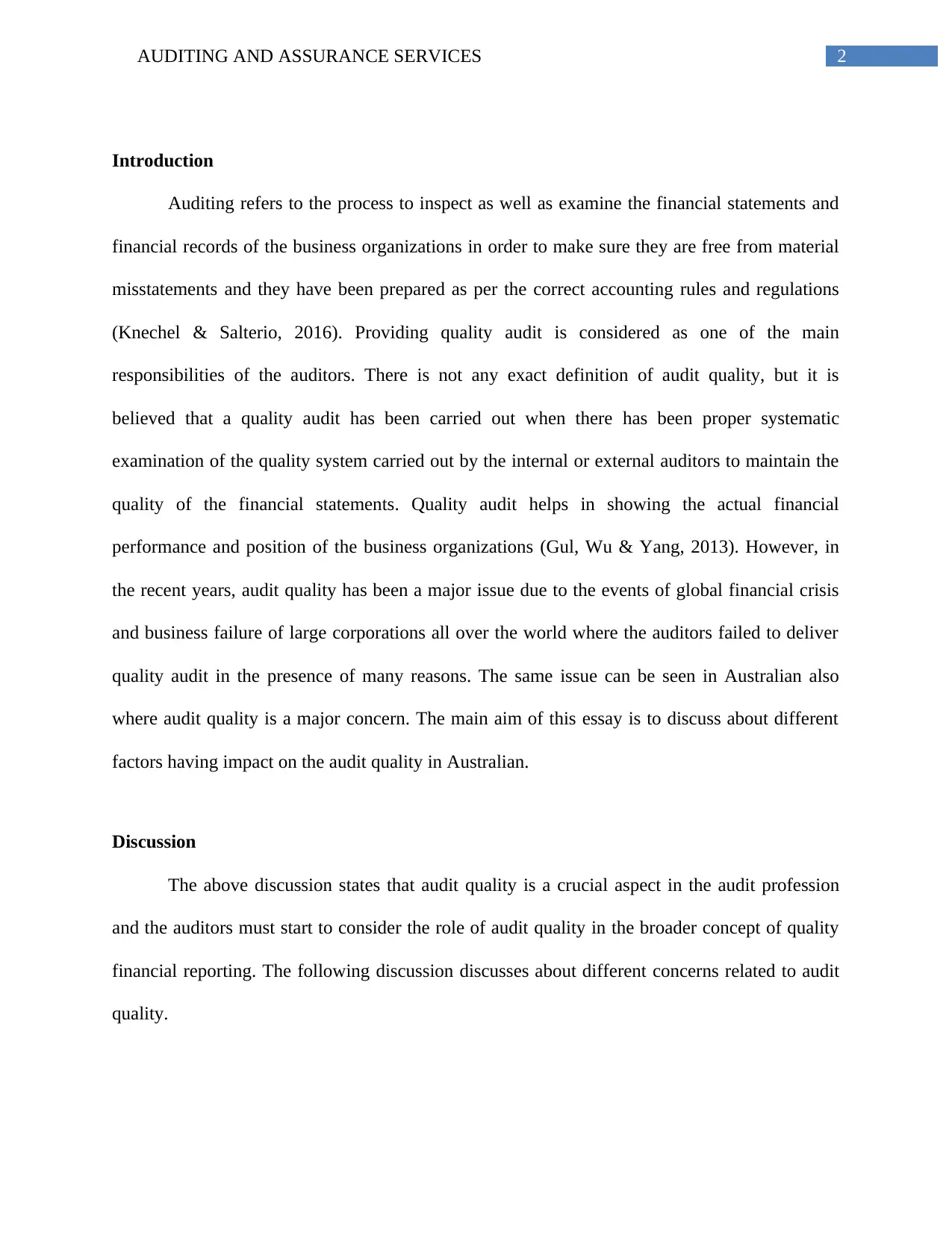
2AUDITING AND ASSURANCE SERVICES
Introduction
Auditing refers to the process to inspect as well as examine the financial statements and
financial records of the business organizations in order to make sure they are free from material
misstatements and they have been prepared as per the correct accounting rules and regulations
(Knechel & Salterio, 2016). Providing quality audit is considered as one of the main
responsibilities of the auditors. There is not any exact definition of audit quality, but it is
believed that a quality audit has been carried out when there has been proper systematic
examination of the quality system carried out by the internal or external auditors to maintain the
quality of the financial statements. Quality audit helps in showing the actual financial
performance and position of the business organizations (Gul, Wu & Yang, 2013). However, in
the recent years, audit quality has been a major issue due to the events of global financial crisis
and business failure of large corporations all over the world where the auditors failed to deliver
quality audit in the presence of many reasons. The same issue can be seen in Australian also
where audit quality is a major concern. The main aim of this essay is to discuss about different
factors having impact on the audit quality in Australian.
Discussion
The above discussion states that audit quality is a crucial aspect in the audit profession
and the auditors must start to consider the role of audit quality in the broader concept of quality
financial reporting. The following discussion discusses about different concerns related to audit
quality.
Introduction
Auditing refers to the process to inspect as well as examine the financial statements and
financial records of the business organizations in order to make sure they are free from material
misstatements and they have been prepared as per the correct accounting rules and regulations
(Knechel & Salterio, 2016). Providing quality audit is considered as one of the main
responsibilities of the auditors. There is not any exact definition of audit quality, but it is
believed that a quality audit has been carried out when there has been proper systematic
examination of the quality system carried out by the internal or external auditors to maintain the
quality of the financial statements. Quality audit helps in showing the actual financial
performance and position of the business organizations (Gul, Wu & Yang, 2013). However, in
the recent years, audit quality has been a major issue due to the events of global financial crisis
and business failure of large corporations all over the world where the auditors failed to deliver
quality audit in the presence of many reasons. The same issue can be seen in Australian also
where audit quality is a major concern. The main aim of this essay is to discuss about different
factors having impact on the audit quality in Australian.
Discussion
The above discussion states that audit quality is a crucial aspect in the audit profession
and the auditors must start to consider the role of audit quality in the broader concept of quality
financial reporting. The following discussion discusses about different concerns related to audit
quality.
⊘ This is a preview!⊘
Do you want full access?
Subscribe today to unlock all pages.

Trusted by 1+ million students worldwide
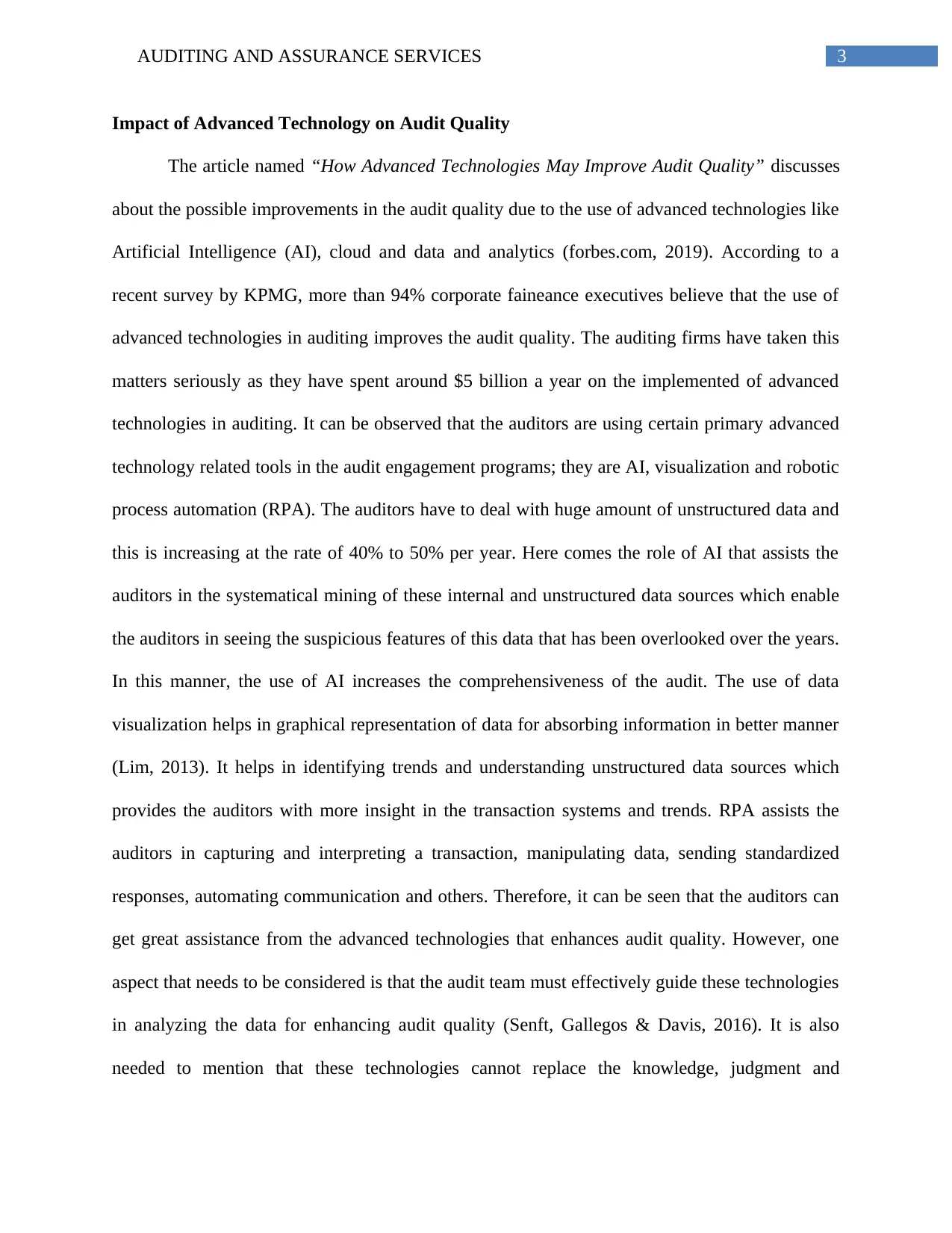
3AUDITING AND ASSURANCE SERVICES
Impact of Advanced Technology on Audit Quality
The article named “How Advanced Technologies May Improve Audit Quality” discusses
about the possible improvements in the audit quality due to the use of advanced technologies like
Artificial Intelligence (AI), cloud and data and analytics (forbes.com, 2019). According to a
recent survey by KPMG, more than 94% corporate faineance executives believe that the use of
advanced technologies in auditing improves the audit quality. The auditing firms have taken this
matters seriously as they have spent around $5 billion a year on the implemented of advanced
technologies in auditing. It can be observed that the auditors are using certain primary advanced
technology related tools in the audit engagement programs; they are AI, visualization and robotic
process automation (RPA). The auditors have to deal with huge amount of unstructured data and
this is increasing at the rate of 40% to 50% per year. Here comes the role of AI that assists the
auditors in the systematical mining of these internal and unstructured data sources which enable
the auditors in seeing the suspicious features of this data that has been overlooked over the years.
In this manner, the use of AI increases the comprehensiveness of the audit. The use of data
visualization helps in graphical representation of data for absorbing information in better manner
(Lim, 2013). It helps in identifying trends and understanding unstructured data sources which
provides the auditors with more insight in the transaction systems and trends. RPA assists the
auditors in capturing and interpreting a transaction, manipulating data, sending standardized
responses, automating communication and others. Therefore, it can be seen that the auditors can
get great assistance from the advanced technologies that enhances audit quality. However, one
aspect that needs to be considered is that the audit team must effectively guide these technologies
in analyzing the data for enhancing audit quality (Senft, Gallegos & Davis, 2016). It is also
needed to mention that these technologies cannot replace the knowledge, judgment and
Impact of Advanced Technology on Audit Quality
The article named “How Advanced Technologies May Improve Audit Quality” discusses
about the possible improvements in the audit quality due to the use of advanced technologies like
Artificial Intelligence (AI), cloud and data and analytics (forbes.com, 2019). According to a
recent survey by KPMG, more than 94% corporate faineance executives believe that the use of
advanced technologies in auditing improves the audit quality. The auditing firms have taken this
matters seriously as they have spent around $5 billion a year on the implemented of advanced
technologies in auditing. It can be observed that the auditors are using certain primary advanced
technology related tools in the audit engagement programs; they are AI, visualization and robotic
process automation (RPA). The auditors have to deal with huge amount of unstructured data and
this is increasing at the rate of 40% to 50% per year. Here comes the role of AI that assists the
auditors in the systematical mining of these internal and unstructured data sources which enable
the auditors in seeing the suspicious features of this data that has been overlooked over the years.
In this manner, the use of AI increases the comprehensiveness of the audit. The use of data
visualization helps in graphical representation of data for absorbing information in better manner
(Lim, 2013). It helps in identifying trends and understanding unstructured data sources which
provides the auditors with more insight in the transaction systems and trends. RPA assists the
auditors in capturing and interpreting a transaction, manipulating data, sending standardized
responses, automating communication and others. Therefore, it can be seen that the auditors can
get great assistance from the advanced technologies that enhances audit quality. However, one
aspect that needs to be considered is that the audit team must effectively guide these technologies
in analyzing the data for enhancing audit quality (Senft, Gallegos & Davis, 2016). It is also
needed to mention that these technologies cannot replace the knowledge, judgment and
Paraphrase This Document
Need a fresh take? Get an instant paraphrase of this document with our AI Paraphraser
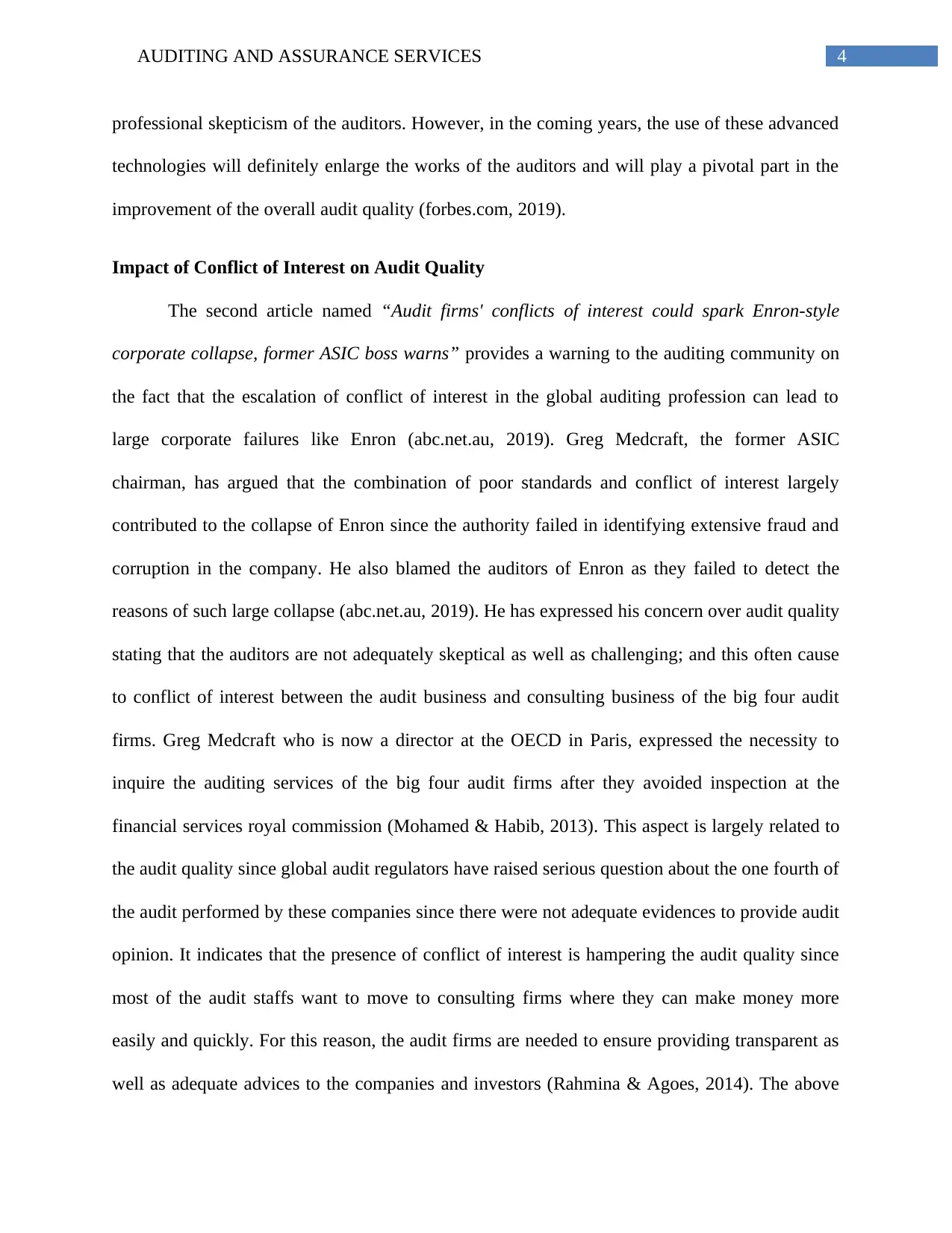
4AUDITING AND ASSURANCE SERVICES
professional skepticism of the auditors. However, in the coming years, the use of these advanced
technologies will definitely enlarge the works of the auditors and will play a pivotal part in the
improvement of the overall audit quality (forbes.com, 2019).
Impact of Conflict of Interest on Audit Quality
The second article named “Audit firms' conflicts of interest could spark Enron-style
corporate collapse, former ASIC boss warns” provides a warning to the auditing community on
the fact that the escalation of conflict of interest in the global auditing profession can lead to
large corporate failures like Enron (abc.net.au, 2019). Greg Medcraft, the former ASIC
chairman, has argued that the combination of poor standards and conflict of interest largely
contributed to the collapse of Enron since the authority failed in identifying extensive fraud and
corruption in the company. He also blamed the auditors of Enron as they failed to detect the
reasons of such large collapse (abc.net.au, 2019). He has expressed his concern over audit quality
stating that the auditors are not adequately skeptical as well as challenging; and this often cause
to conflict of interest between the audit business and consulting business of the big four audit
firms. Greg Medcraft who is now a director at the OECD in Paris, expressed the necessity to
inquire the auditing services of the big four audit firms after they avoided inspection at the
financial services royal commission (Mohamed & Habib, 2013). This aspect is largely related to
the audit quality since global audit regulators have raised serious question about the one fourth of
the audit performed by these companies since there were not adequate evidences to provide audit
opinion. It indicates that the presence of conflict of interest is hampering the audit quality since
most of the audit staffs want to move to consulting firms where they can make money more
easily and quickly. For this reason, the audit firms are needed to ensure providing transparent as
well as adequate advices to the companies and investors (Rahmina & Agoes, 2014). The above
professional skepticism of the auditors. However, in the coming years, the use of these advanced
technologies will definitely enlarge the works of the auditors and will play a pivotal part in the
improvement of the overall audit quality (forbes.com, 2019).
Impact of Conflict of Interest on Audit Quality
The second article named “Audit firms' conflicts of interest could spark Enron-style
corporate collapse, former ASIC boss warns” provides a warning to the auditing community on
the fact that the escalation of conflict of interest in the global auditing profession can lead to
large corporate failures like Enron (abc.net.au, 2019). Greg Medcraft, the former ASIC
chairman, has argued that the combination of poor standards and conflict of interest largely
contributed to the collapse of Enron since the authority failed in identifying extensive fraud and
corruption in the company. He also blamed the auditors of Enron as they failed to detect the
reasons of such large collapse (abc.net.au, 2019). He has expressed his concern over audit quality
stating that the auditors are not adequately skeptical as well as challenging; and this often cause
to conflict of interest between the audit business and consulting business of the big four audit
firms. Greg Medcraft who is now a director at the OECD in Paris, expressed the necessity to
inquire the auditing services of the big four audit firms after they avoided inspection at the
financial services royal commission (Mohamed & Habib, 2013). This aspect is largely related to
the audit quality since global audit regulators have raised serious question about the one fourth of
the audit performed by these companies since there were not adequate evidences to provide audit
opinion. It indicates that the presence of conflict of interest is hampering the audit quality since
most of the audit staffs want to move to consulting firms where they can make money more
easily and quickly. For this reason, the audit firms are needed to ensure providing transparent as
well as adequate advices to the companies and investors (Rahmina & Agoes, 2014). The above
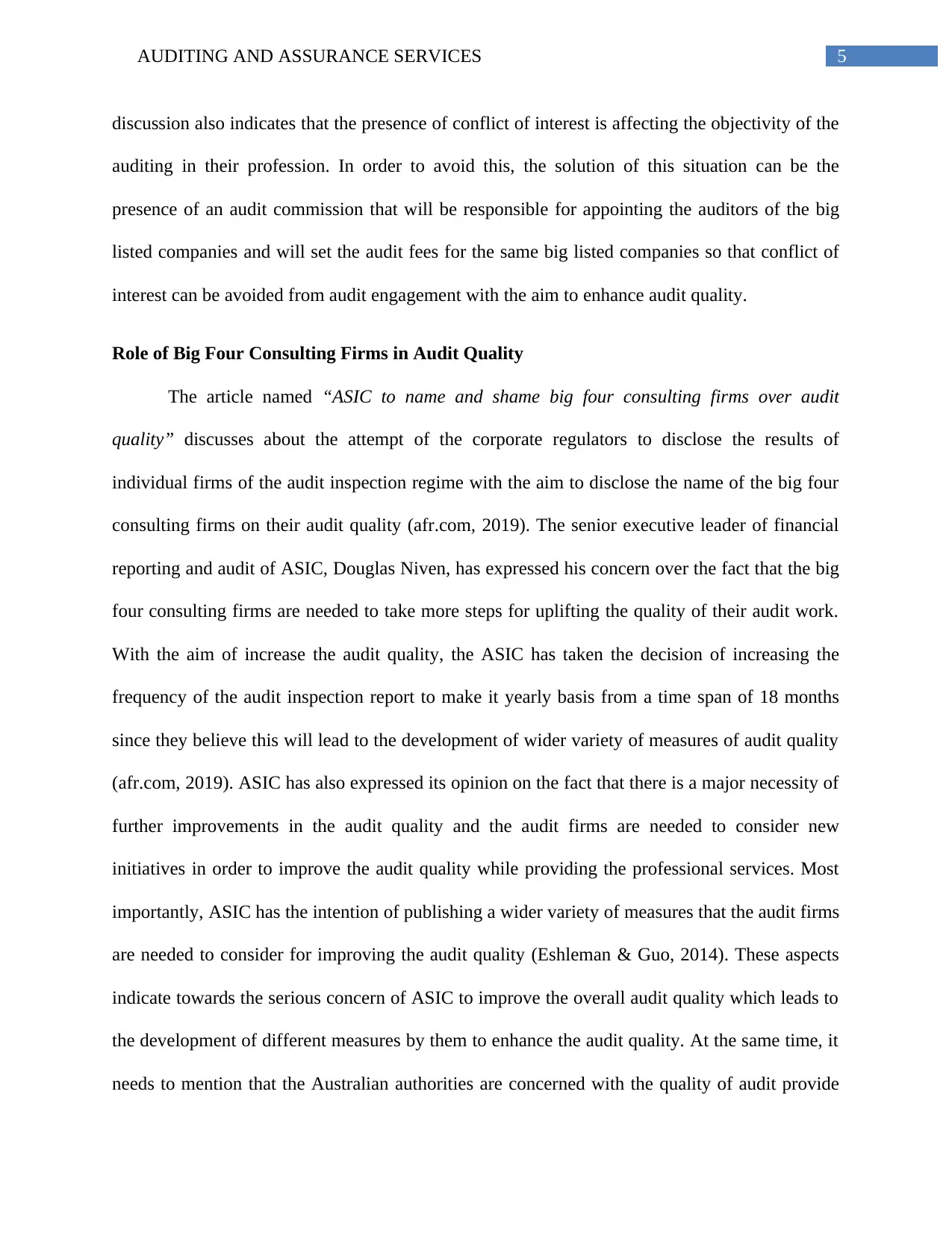
5AUDITING AND ASSURANCE SERVICES
discussion also indicates that the presence of conflict of interest is affecting the objectivity of the
auditing in their profession. In order to avoid this, the solution of this situation can be the
presence of an audit commission that will be responsible for appointing the auditors of the big
listed companies and will set the audit fees for the same big listed companies so that conflict of
interest can be avoided from audit engagement with the aim to enhance audit quality.
Role of Big Four Consulting Firms in Audit Quality
The article named “ASIC to name and shame big four consulting firms over audit
quality” discusses about the attempt of the corporate regulators to disclose the results of
individual firms of the audit inspection regime with the aim to disclose the name of the big four
consulting firms on their audit quality (afr.com, 2019). The senior executive leader of financial
reporting and audit of ASIC, Douglas Niven, has expressed his concern over the fact that the big
four consulting firms are needed to take more steps for uplifting the quality of their audit work.
With the aim of increase the audit quality, the ASIC has taken the decision of increasing the
frequency of the audit inspection report to make it yearly basis from a time span of 18 months
since they believe this will lead to the development of wider variety of measures of audit quality
(afr.com, 2019). ASIC has also expressed its opinion on the fact that there is a major necessity of
further improvements in the audit quality and the audit firms are needed to consider new
initiatives in order to improve the audit quality while providing the professional services. Most
importantly, ASIC has the intention of publishing a wider variety of measures that the audit firms
are needed to consider for improving the audit quality (Eshleman & Guo, 2014). These aspects
indicate towards the serious concern of ASIC to improve the overall audit quality which leads to
the development of different measures by them to enhance the audit quality. At the same time, it
needs to mention that the Australian authorities are concerned with the quality of audit provide
discussion also indicates that the presence of conflict of interest is affecting the objectivity of the
auditing in their profession. In order to avoid this, the solution of this situation can be the
presence of an audit commission that will be responsible for appointing the auditors of the big
listed companies and will set the audit fees for the same big listed companies so that conflict of
interest can be avoided from audit engagement with the aim to enhance audit quality.
Role of Big Four Consulting Firms in Audit Quality
The article named “ASIC to name and shame big four consulting firms over audit
quality” discusses about the attempt of the corporate regulators to disclose the results of
individual firms of the audit inspection regime with the aim to disclose the name of the big four
consulting firms on their audit quality (afr.com, 2019). The senior executive leader of financial
reporting and audit of ASIC, Douglas Niven, has expressed his concern over the fact that the big
four consulting firms are needed to take more steps for uplifting the quality of their audit work.
With the aim of increase the audit quality, the ASIC has taken the decision of increasing the
frequency of the audit inspection report to make it yearly basis from a time span of 18 months
since they believe this will lead to the development of wider variety of measures of audit quality
(afr.com, 2019). ASIC has also expressed its opinion on the fact that there is a major necessity of
further improvements in the audit quality and the audit firms are needed to consider new
initiatives in order to improve the audit quality while providing the professional services. Most
importantly, ASIC has the intention of publishing a wider variety of measures that the audit firms
are needed to consider for improving the audit quality (Eshleman & Guo, 2014). These aspects
indicate towards the serious concern of ASIC to improve the overall audit quality which leads to
the development of different measures by them to enhance the audit quality. At the same time, it
needs to mention that the Australian authorities are concerned with the quality of audit provide
⊘ This is a preview!⊘
Do you want full access?
Subscribe today to unlock all pages.

Trusted by 1+ million students worldwide
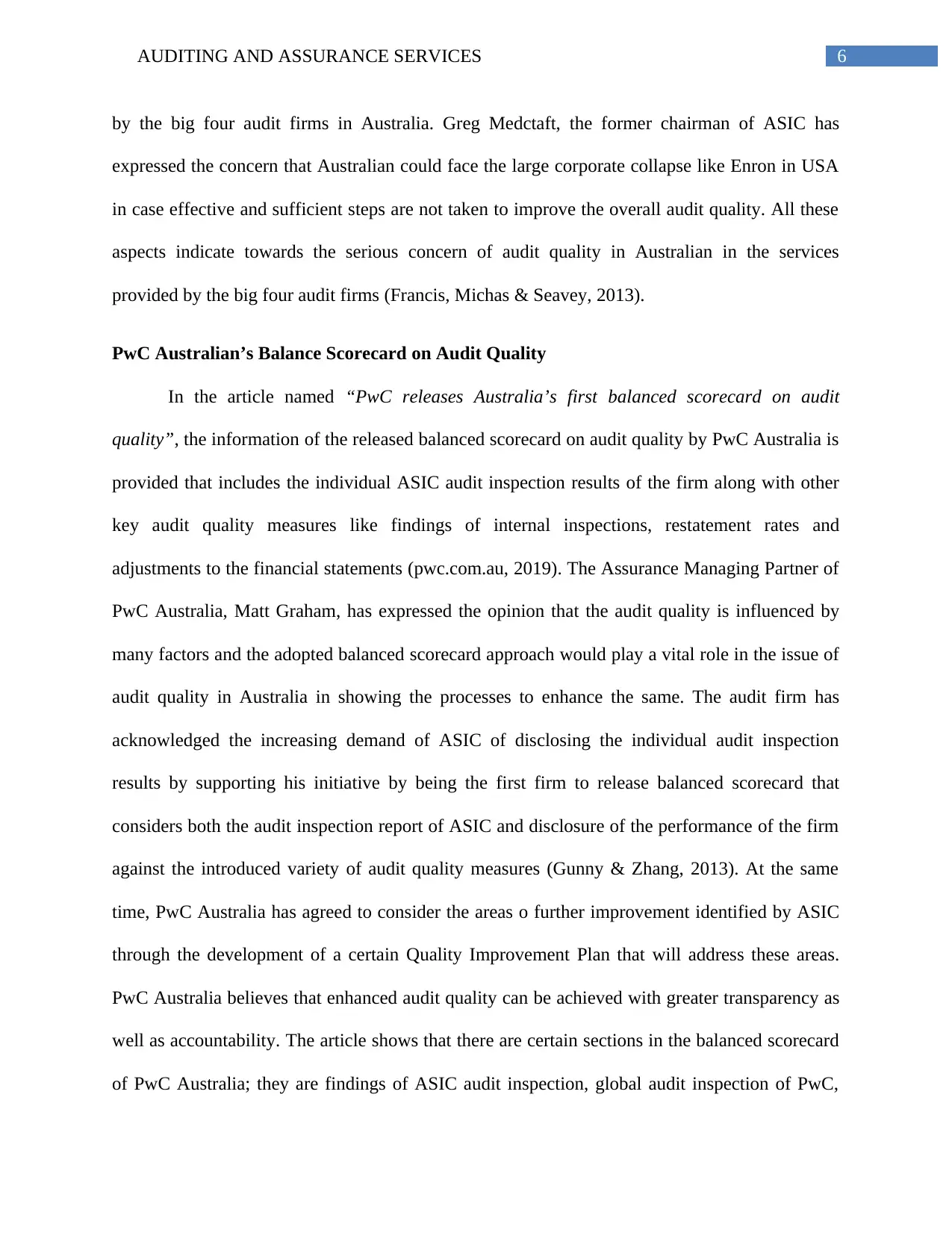
6AUDITING AND ASSURANCE SERVICES
by the big four audit firms in Australia. Greg Medctaft, the former chairman of ASIC has
expressed the concern that Australian could face the large corporate collapse like Enron in USA
in case effective and sufficient steps are not taken to improve the overall audit quality. All these
aspects indicate towards the serious concern of audit quality in Australian in the services
provided by the big four audit firms (Francis, Michas & Seavey, 2013).
PwC Australian’s Balance Scorecard on Audit Quality
In the article named “PwC releases Australia’s first balanced scorecard on audit
quality”, the information of the released balanced scorecard on audit quality by PwC Australia is
provided that includes the individual ASIC audit inspection results of the firm along with other
key audit quality measures like findings of internal inspections, restatement rates and
adjustments to the financial statements (pwc.com.au, 2019). The Assurance Managing Partner of
PwC Australia, Matt Graham, has expressed the opinion that the audit quality is influenced by
many factors and the adopted balanced scorecard approach would play a vital role in the issue of
audit quality in Australia in showing the processes to enhance the same. The audit firm has
acknowledged the increasing demand of ASIC of disclosing the individual audit inspection
results by supporting his initiative by being the first firm to release balanced scorecard that
considers both the audit inspection report of ASIC and disclosure of the performance of the firm
against the introduced variety of audit quality measures (Gunny & Zhang, 2013). At the same
time, PwC Australia has agreed to consider the areas o further improvement identified by ASIC
through the development of a certain Quality Improvement Plan that will address these areas.
PwC Australia believes that enhanced audit quality can be achieved with greater transparency as
well as accountability. The article shows that there are certain sections in the balanced scorecard
of PwC Australia; they are findings of ASIC audit inspection, global audit inspection of PwC,
by the big four audit firms in Australia. Greg Medctaft, the former chairman of ASIC has
expressed the concern that Australian could face the large corporate collapse like Enron in USA
in case effective and sufficient steps are not taken to improve the overall audit quality. All these
aspects indicate towards the serious concern of audit quality in Australian in the services
provided by the big four audit firms (Francis, Michas & Seavey, 2013).
PwC Australian’s Balance Scorecard on Audit Quality
In the article named “PwC releases Australia’s first balanced scorecard on audit
quality”, the information of the released balanced scorecard on audit quality by PwC Australia is
provided that includes the individual ASIC audit inspection results of the firm along with other
key audit quality measures like findings of internal inspections, restatement rates and
adjustments to the financial statements (pwc.com.au, 2019). The Assurance Managing Partner of
PwC Australia, Matt Graham, has expressed the opinion that the audit quality is influenced by
many factors and the adopted balanced scorecard approach would play a vital role in the issue of
audit quality in Australia in showing the processes to enhance the same. The audit firm has
acknowledged the increasing demand of ASIC of disclosing the individual audit inspection
results by supporting his initiative by being the first firm to release balanced scorecard that
considers both the audit inspection report of ASIC and disclosure of the performance of the firm
against the introduced variety of audit quality measures (Gunny & Zhang, 2013). At the same
time, PwC Australia has agreed to consider the areas o further improvement identified by ASIC
through the development of a certain Quality Improvement Plan that will address these areas.
PwC Australia believes that enhanced audit quality can be achieved with greater transparency as
well as accountability. The article shows that there are certain sections in the balanced scorecard
of PwC Australia; they are findings of ASIC audit inspection, global audit inspection of PwC,
Paraphrase This Document
Need a fresh take? Get an instant paraphrase of this document with our AI Paraphraser
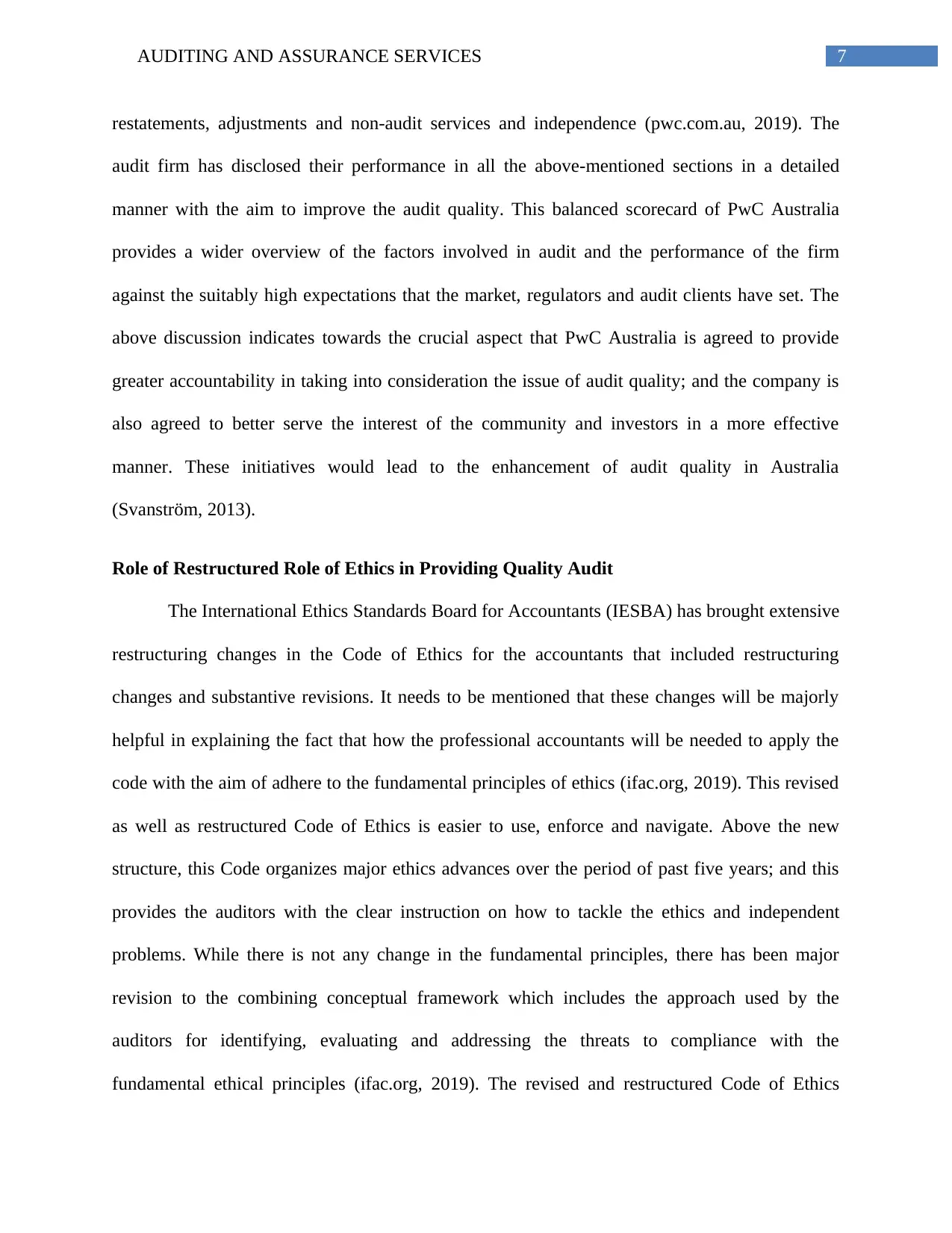
7AUDITING AND ASSURANCE SERVICES
restatements, adjustments and non-audit services and independence (pwc.com.au, 2019). The
audit firm has disclosed their performance in all the above-mentioned sections in a detailed
manner with the aim to improve the audit quality. This balanced scorecard of PwC Australia
provides a wider overview of the factors involved in audit and the performance of the firm
against the suitably high expectations that the market, regulators and audit clients have set. The
above discussion indicates towards the crucial aspect that PwC Australia is agreed to provide
greater accountability in taking into consideration the issue of audit quality; and the company is
also agreed to better serve the interest of the community and investors in a more effective
manner. These initiatives would lead to the enhancement of audit quality in Australia
(Svanström, 2013).
Role of Restructured Role of Ethics in Providing Quality Audit
The International Ethics Standards Board for Accountants (IESBA) has brought extensive
restructuring changes in the Code of Ethics for the accountants that included restructuring
changes and substantive revisions. It needs to be mentioned that these changes will be majorly
helpful in explaining the fact that how the professional accountants will be needed to apply the
code with the aim of adhere to the fundamental principles of ethics (ifac.org, 2019). This revised
as well as restructured Code of Ethics is easier to use, enforce and navigate. Above the new
structure, this Code organizes major ethics advances over the period of past five years; and this
provides the auditors with the clear instruction on how to tackle the ethics and independent
problems. While there is not any change in the fundamental principles, there has been major
revision to the combining conceptual framework which includes the approach used by the
auditors for identifying, evaluating and addressing the threats to compliance with the
fundamental ethical principles (ifac.org, 2019). The revised and restructured Code of Ethics
restatements, adjustments and non-audit services and independence (pwc.com.au, 2019). The
audit firm has disclosed their performance in all the above-mentioned sections in a detailed
manner with the aim to improve the audit quality. This balanced scorecard of PwC Australia
provides a wider overview of the factors involved in audit and the performance of the firm
against the suitably high expectations that the market, regulators and audit clients have set. The
above discussion indicates towards the crucial aspect that PwC Australia is agreed to provide
greater accountability in taking into consideration the issue of audit quality; and the company is
also agreed to better serve the interest of the community and investors in a more effective
manner. These initiatives would lead to the enhancement of audit quality in Australia
(Svanström, 2013).
Role of Restructured Role of Ethics in Providing Quality Audit
The International Ethics Standards Board for Accountants (IESBA) has brought extensive
restructuring changes in the Code of Ethics for the accountants that included restructuring
changes and substantive revisions. It needs to be mentioned that these changes will be majorly
helpful in explaining the fact that how the professional accountants will be needed to apply the
code with the aim of adhere to the fundamental principles of ethics (ifac.org, 2019). This revised
as well as restructured Code of Ethics is easier to use, enforce and navigate. Above the new
structure, this Code organizes major ethics advances over the period of past five years; and this
provides the auditors with the clear instruction on how to tackle the ethics and independent
problems. While there is not any change in the fundamental principles, there has been major
revision to the combining conceptual framework which includes the approach used by the
auditors for identifying, evaluating and addressing the threats to compliance with the
fundamental ethical principles (ifac.org, 2019). The revised and restructured Code of Ethics
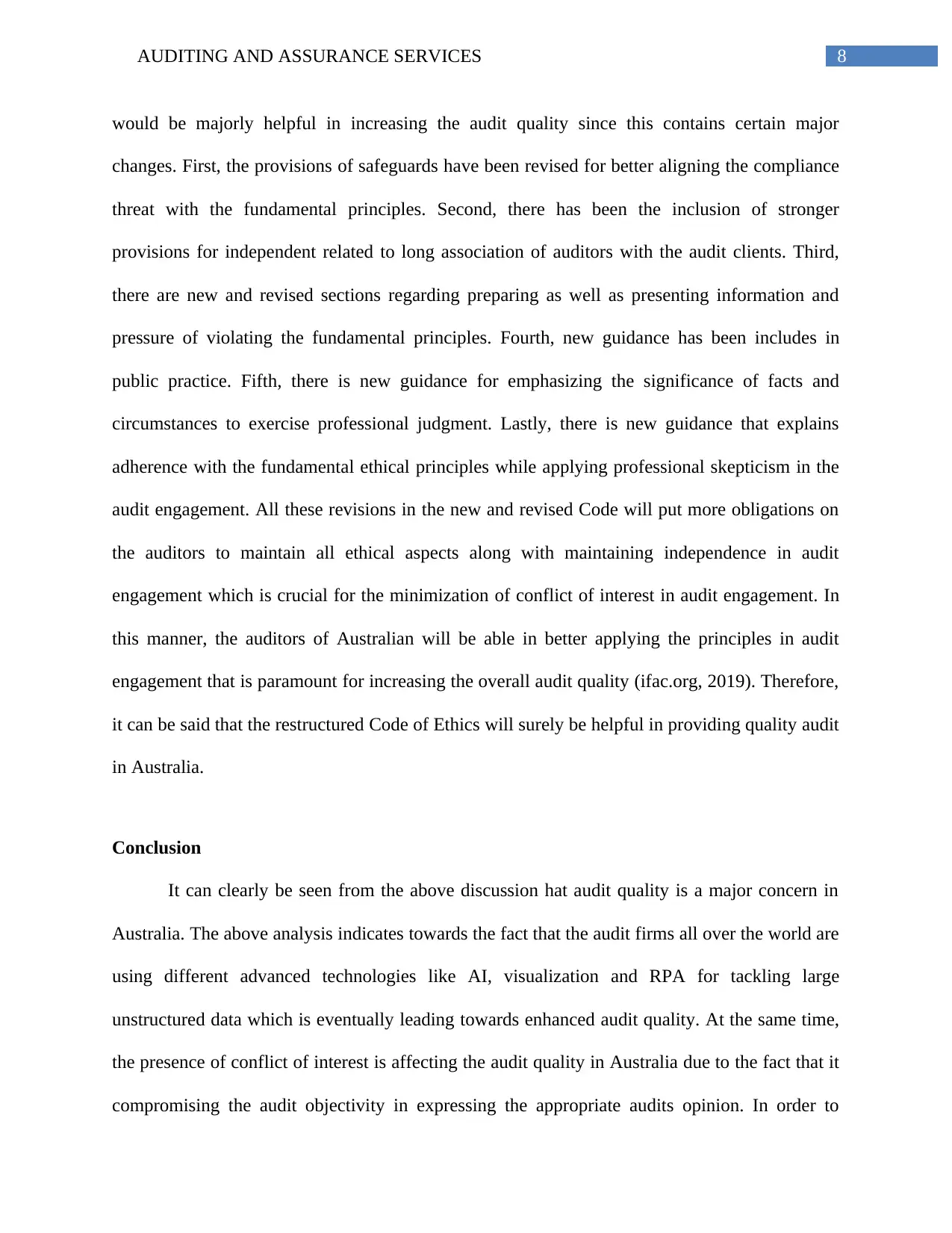
8AUDITING AND ASSURANCE SERVICES
would be majorly helpful in increasing the audit quality since this contains certain major
changes. First, the provisions of safeguards have been revised for better aligning the compliance
threat with the fundamental principles. Second, there has been the inclusion of stronger
provisions for independent related to long association of auditors with the audit clients. Third,
there are new and revised sections regarding preparing as well as presenting information and
pressure of violating the fundamental principles. Fourth, new guidance has been includes in
public practice. Fifth, there is new guidance for emphasizing the significance of facts and
circumstances to exercise professional judgment. Lastly, there is new guidance that explains
adherence with the fundamental ethical principles while applying professional skepticism in the
audit engagement. All these revisions in the new and revised Code will put more obligations on
the auditors to maintain all ethical aspects along with maintaining independence in audit
engagement which is crucial for the minimization of conflict of interest in audit engagement. In
this manner, the auditors of Australian will be able in better applying the principles in audit
engagement that is paramount for increasing the overall audit quality (ifac.org, 2019). Therefore,
it can be said that the restructured Code of Ethics will surely be helpful in providing quality audit
in Australia.
Conclusion
It can clearly be seen from the above discussion hat audit quality is a major concern in
Australia. The above analysis indicates towards the fact that the audit firms all over the world are
using different advanced technologies like AI, visualization and RPA for tackling large
unstructured data which is eventually leading towards enhanced audit quality. At the same time,
the presence of conflict of interest is affecting the audit quality in Australia due to the fact that it
compromising the audit objectivity in expressing the appropriate audits opinion. In order to
would be majorly helpful in increasing the audit quality since this contains certain major
changes. First, the provisions of safeguards have been revised for better aligning the compliance
threat with the fundamental principles. Second, there has been the inclusion of stronger
provisions for independent related to long association of auditors with the audit clients. Third,
there are new and revised sections regarding preparing as well as presenting information and
pressure of violating the fundamental principles. Fourth, new guidance has been includes in
public practice. Fifth, there is new guidance for emphasizing the significance of facts and
circumstances to exercise professional judgment. Lastly, there is new guidance that explains
adherence with the fundamental ethical principles while applying professional skepticism in the
audit engagement. All these revisions in the new and revised Code will put more obligations on
the auditors to maintain all ethical aspects along with maintaining independence in audit
engagement which is crucial for the minimization of conflict of interest in audit engagement. In
this manner, the auditors of Australian will be able in better applying the principles in audit
engagement that is paramount for increasing the overall audit quality (ifac.org, 2019). Therefore,
it can be said that the restructured Code of Ethics will surely be helpful in providing quality audit
in Australia.
Conclusion
It can clearly be seen from the above discussion hat audit quality is a major concern in
Australia. The above analysis indicates towards the fact that the audit firms all over the world are
using different advanced technologies like AI, visualization and RPA for tackling large
unstructured data which is eventually leading towards enhanced audit quality. At the same time,
the presence of conflict of interest is affecting the audit quality in Australia due to the fact that it
compromising the audit objectivity in expressing the appropriate audits opinion. In order to
⊘ This is a preview!⊘
Do you want full access?
Subscribe today to unlock all pages.

Trusted by 1+ million students worldwide
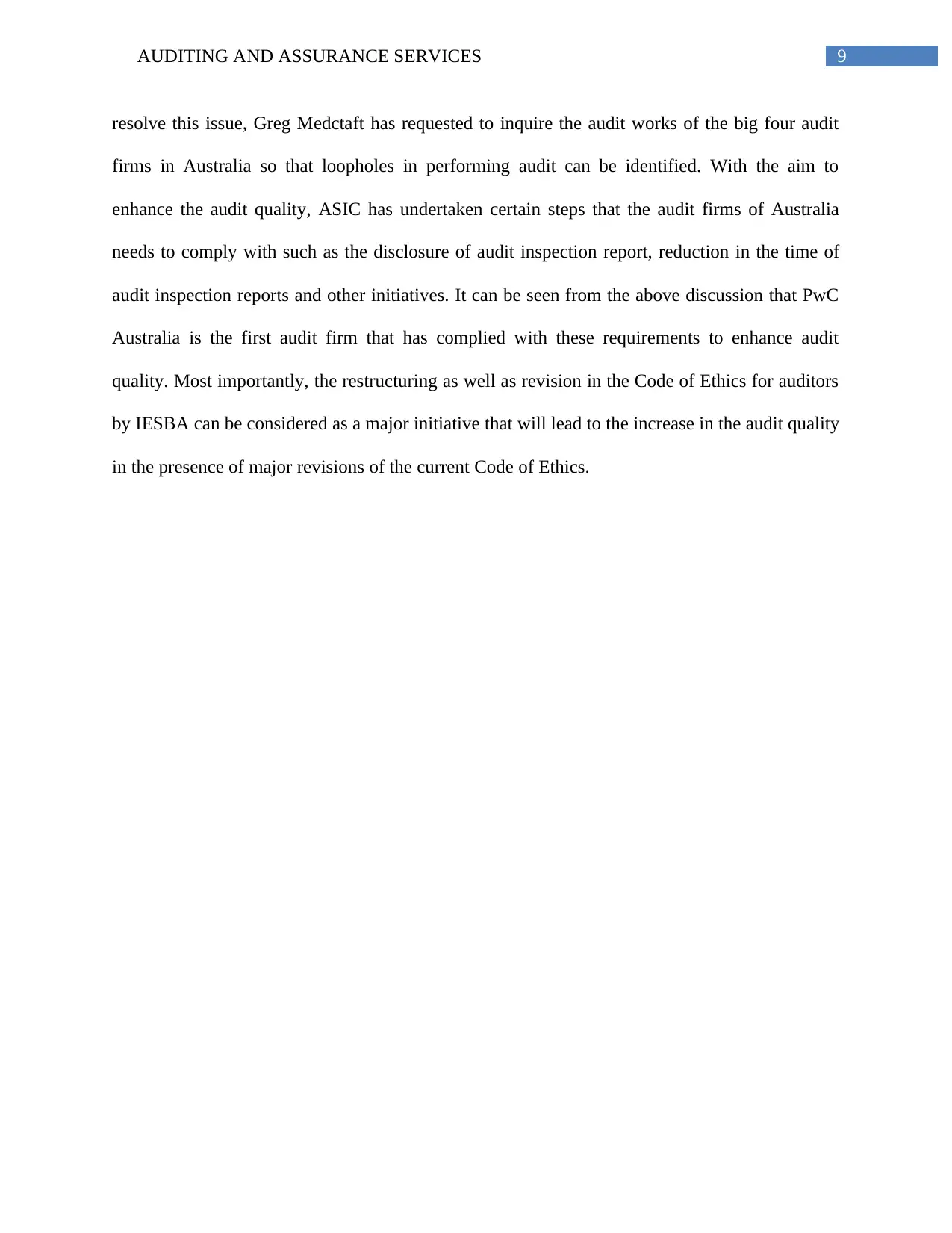
9AUDITING AND ASSURANCE SERVICES
resolve this issue, Greg Medctaft has requested to inquire the audit works of the big four audit
firms in Australia so that loopholes in performing audit can be identified. With the aim to
enhance the audit quality, ASIC has undertaken certain steps that the audit firms of Australia
needs to comply with such as the disclosure of audit inspection report, reduction in the time of
audit inspection reports and other initiatives. It can be seen from the above discussion that PwC
Australia is the first audit firm that has complied with these requirements to enhance audit
quality. Most importantly, the restructuring as well as revision in the Code of Ethics for auditors
by IESBA can be considered as a major initiative that will lead to the increase in the audit quality
in the presence of major revisions of the current Code of Ethics.
resolve this issue, Greg Medctaft has requested to inquire the audit works of the big four audit
firms in Australia so that loopholes in performing audit can be identified. With the aim to
enhance the audit quality, ASIC has undertaken certain steps that the audit firms of Australia
needs to comply with such as the disclosure of audit inspection report, reduction in the time of
audit inspection reports and other initiatives. It can be seen from the above discussion that PwC
Australia is the first audit firm that has complied with these requirements to enhance audit
quality. Most importantly, the restructuring as well as revision in the Code of Ethics for auditors
by IESBA can be considered as a major initiative that will lead to the increase in the audit quality
in the presence of major revisions of the current Code of Ethics.
Paraphrase This Document
Need a fresh take? Get an instant paraphrase of this document with our AI Paraphraser
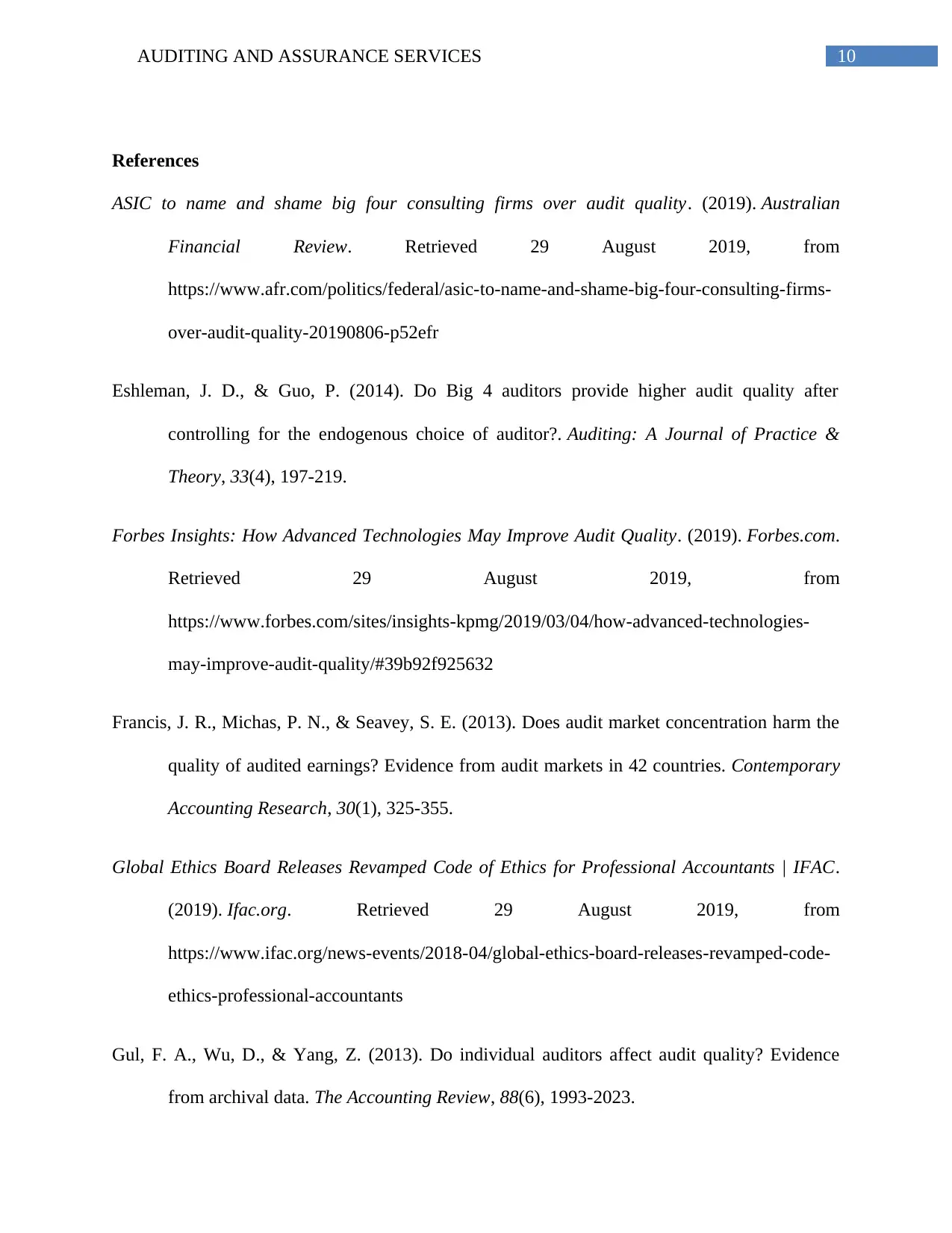
10AUDITING AND ASSURANCE SERVICES
References
ASIC to name and shame big four consulting firms over audit quality. (2019). Australian
Financial Review. Retrieved 29 August 2019, from
https://www.afr.com/politics/federal/asic-to-name-and-shame-big-four-consulting-firms-
over-audit-quality-20190806-p52efr
Eshleman, J. D., & Guo, P. (2014). Do Big 4 auditors provide higher audit quality after
controlling for the endogenous choice of auditor?. Auditing: A Journal of Practice &
Theory, 33(4), 197-219.
Forbes Insights: How Advanced Technologies May Improve Audit Quality. (2019). Forbes.com.
Retrieved 29 August 2019, from
https://www.forbes.com/sites/insights-kpmg/2019/03/04/how-advanced-technologies-
may-improve-audit-quality/#39b92f925632
Francis, J. R., Michas, P. N., & Seavey, S. E. (2013). Does audit market concentration harm the
quality of audited earnings? Evidence from audit markets in 42 countries. Contemporary
Accounting Research, 30(1), 325-355.
Global Ethics Board Releases Revamped Code of Ethics for Professional Accountants | IFAC.
(2019). Ifac.org. Retrieved 29 August 2019, from
https://www.ifac.org/news-events/2018-04/global-ethics-board-releases-revamped-code-
ethics-professional-accountants
Gul, F. A., Wu, D., & Yang, Z. (2013). Do individual auditors affect audit quality? Evidence
from archival data. The Accounting Review, 88(6), 1993-2023.
References
ASIC to name and shame big four consulting firms over audit quality. (2019). Australian
Financial Review. Retrieved 29 August 2019, from
https://www.afr.com/politics/federal/asic-to-name-and-shame-big-four-consulting-firms-
over-audit-quality-20190806-p52efr
Eshleman, J. D., & Guo, P. (2014). Do Big 4 auditors provide higher audit quality after
controlling for the endogenous choice of auditor?. Auditing: A Journal of Practice &
Theory, 33(4), 197-219.
Forbes Insights: How Advanced Technologies May Improve Audit Quality. (2019). Forbes.com.
Retrieved 29 August 2019, from
https://www.forbes.com/sites/insights-kpmg/2019/03/04/how-advanced-technologies-
may-improve-audit-quality/#39b92f925632
Francis, J. R., Michas, P. N., & Seavey, S. E. (2013). Does audit market concentration harm the
quality of audited earnings? Evidence from audit markets in 42 countries. Contemporary
Accounting Research, 30(1), 325-355.
Global Ethics Board Releases Revamped Code of Ethics for Professional Accountants | IFAC.
(2019). Ifac.org. Retrieved 29 August 2019, from
https://www.ifac.org/news-events/2018-04/global-ethics-board-releases-revamped-code-
ethics-professional-accountants
Gul, F. A., Wu, D., & Yang, Z. (2013). Do individual auditors affect audit quality? Evidence
from archival data. The Accounting Review, 88(6), 1993-2023.
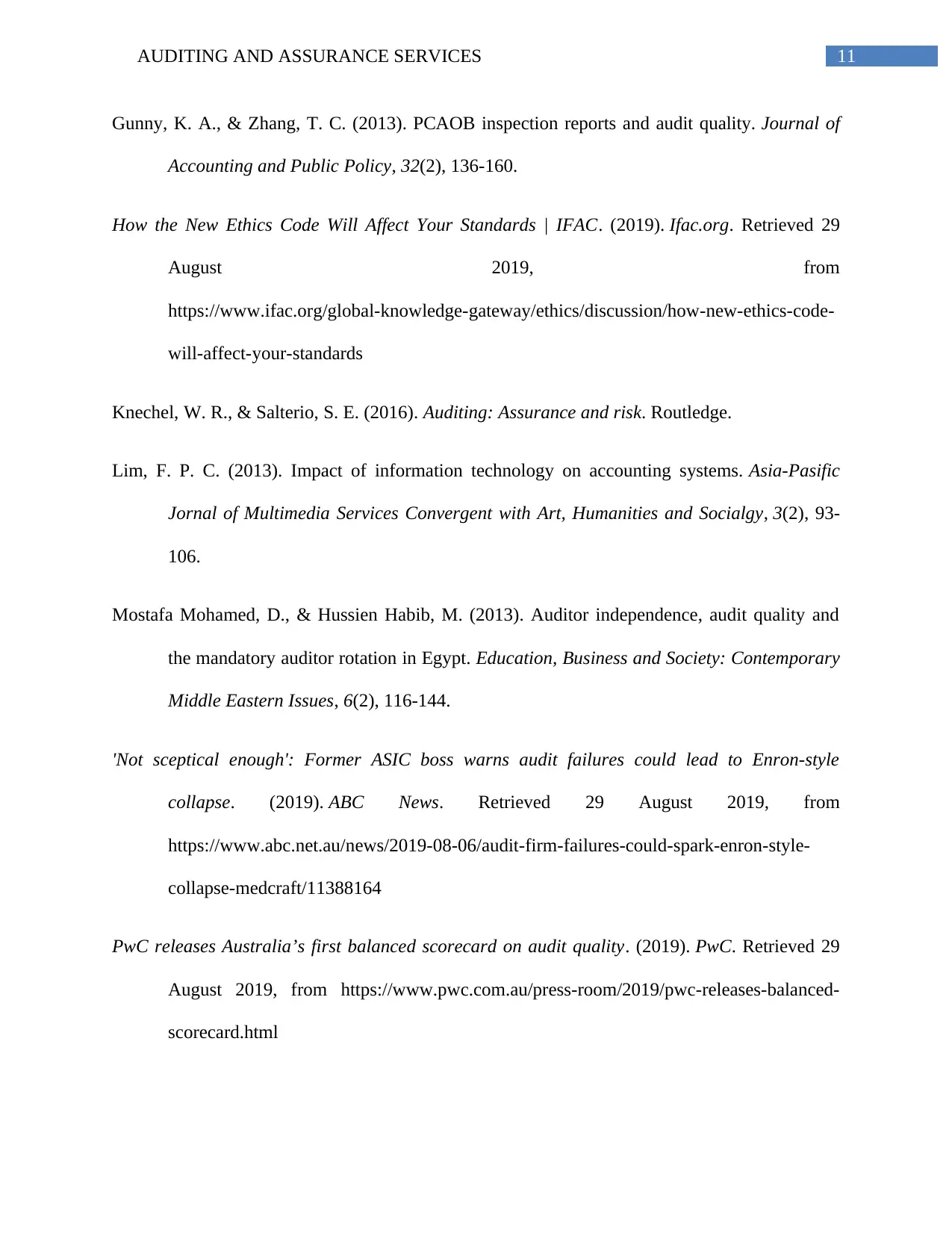
11AUDITING AND ASSURANCE SERVICES
Gunny, K. A., & Zhang, T. C. (2013). PCAOB inspection reports and audit quality. Journal of
Accounting and Public Policy, 32(2), 136-160.
How the New Ethics Code Will Affect Your Standards | IFAC. (2019). Ifac.org. Retrieved 29
August 2019, from
https://www.ifac.org/global-knowledge-gateway/ethics/discussion/how-new-ethics-code-
will-affect-your-standards
Knechel, W. R., & Salterio, S. E. (2016). Auditing: Assurance and risk. Routledge.
Lim, F. P. C. (2013). Impact of information technology on accounting systems. Asia-Pasific
Jornal of Multimedia Services Convergent with Art, Humanities and Socialgy, 3(2), 93-
106.
Mostafa Mohamed, D., & Hussien Habib, M. (2013). Auditor independence, audit quality and
the mandatory auditor rotation in Egypt. Education, Business and Society: Contemporary
Middle Eastern Issues, 6(2), 116-144.
'Not sceptical enough': Former ASIC boss warns audit failures could lead to Enron-style
collapse. (2019). ABC News. Retrieved 29 August 2019, from
https://www.abc.net.au/news/2019-08-06/audit-firm-failures-could-spark-enron-style-
collapse-medcraft/11388164
PwC releases Australia’s first balanced scorecard on audit quality. (2019). PwC. Retrieved 29
August 2019, from https://www.pwc.com.au/press-room/2019/pwc-releases-balanced-
scorecard.html
Gunny, K. A., & Zhang, T. C. (2013). PCAOB inspection reports and audit quality. Journal of
Accounting and Public Policy, 32(2), 136-160.
How the New Ethics Code Will Affect Your Standards | IFAC. (2019). Ifac.org. Retrieved 29
August 2019, from
https://www.ifac.org/global-knowledge-gateway/ethics/discussion/how-new-ethics-code-
will-affect-your-standards
Knechel, W. R., & Salterio, S. E. (2016). Auditing: Assurance and risk. Routledge.
Lim, F. P. C. (2013). Impact of information technology on accounting systems. Asia-Pasific
Jornal of Multimedia Services Convergent with Art, Humanities and Socialgy, 3(2), 93-
106.
Mostafa Mohamed, D., & Hussien Habib, M. (2013). Auditor independence, audit quality and
the mandatory auditor rotation in Egypt. Education, Business and Society: Contemporary
Middle Eastern Issues, 6(2), 116-144.
'Not sceptical enough': Former ASIC boss warns audit failures could lead to Enron-style
collapse. (2019). ABC News. Retrieved 29 August 2019, from
https://www.abc.net.au/news/2019-08-06/audit-firm-failures-could-spark-enron-style-
collapse-medcraft/11388164
PwC releases Australia’s first balanced scorecard on audit quality. (2019). PwC. Retrieved 29
August 2019, from https://www.pwc.com.au/press-room/2019/pwc-releases-balanced-
scorecard.html
⊘ This is a preview!⊘
Do you want full access?
Subscribe today to unlock all pages.

Trusted by 1+ million students worldwide
1 out of 13
Related Documents
Your All-in-One AI-Powered Toolkit for Academic Success.
+13062052269
info@desklib.com
Available 24*7 on WhatsApp / Email
![[object Object]](/_next/static/media/star-bottom.7253800d.svg)
Unlock your academic potential
Copyright © 2020–2026 A2Z Services. All Rights Reserved. Developed and managed by ZUCOL.





